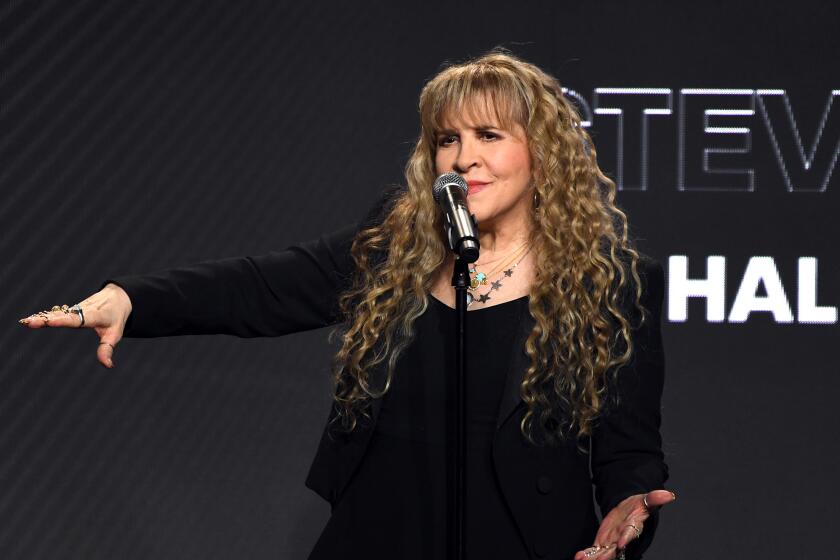Fresh Allmans: The Mix Keeps Changing, but This Legendary Band Retains Its Distinctive Flavor
- Share via
Twenty years after it first ignited a mass rock audience, the signature sound of the Allman Brothers Band remains fresh and exciting.
After releasing their first two albums in 1969 and 1970, the Allman Brothers blossomed on “At Fillmore East” in 1971. The double-album showcased two superb guitarists, Duane Allman and Dickey Betts, putting on a remarkable air show in which they would soar together in harmony, or spiral off on individual but complementary flight patterns. Underneath them was a churning, tidal rhythm section. And, when the long instrumental sallies had ended, Gregg Allman would bring a voice of full of blues anguish to songs like “Whipping Post” and “One Way Out.”
Duane, the elder Allman brother, died in a motorcycle accident 20 years ago this month and became an instant guitar legend--not only for his performances with the Allman Brothers, but for such outside work as his playing opposite Eric Clapton on Derek & the Dominoes’ “Layla” album and his incendiary solo on Wilson Pickett’s cover of “Hey Jude.”
The Allman Brothers Band carried on, and even prospered, after Duane’s death and the 1972 death (also by motorcycle accident) of bassist Berry Oakley. In 1972 and 1973, the albums “Eat a Peach” and “Brothers and Sisters” (a number one album that included the lighter, countrified sound of Betts’ wistful “Ramblin’ Man”) established the Allman Brothers as one of the biggest attractions in rock.
But the Allman Brothers lost their momentum as drug problems and internal strife set in. The band broke up bitterly in 1976, regrouped in 1978, and petered out four years later following a series of indifferent albums.
Now the Allman Brothers are on their third go-round. The 1989 release of a retrospective boxed set, “Dreams,” prompted a reunion tour that year. Since then, the band has managed to hang together, issuing two albums of new music in the old style. The first comeback album, 1990’s “Seven Turns,” featured a seven-man lineup; the new “Shades of Two Worlds” finds the Allman Brothers back to the same six-piece format as the “At Fillmore East” lineup. Betts, Allman, and the double-drummer combination of Butch Trucks and Jaimoe remain from the original band. They are joined by guitarist Warren Haynes and bassist Allen Woody.
“Shades of Two Worlds” also reintroduces the long, winding double guitar excursions of the “At Fillmore East” period, with Betts sounding more accomplished than ever, and Haynes doing a capable job in the slide guitar role that Duane Allman defined. While the album’s two long guitar showpieces, “Nobody Knows” and the jazz-inspired “Kind of Bird,” don’t match the compositional excellence of the band’s classics, they prove that the Allman Brothers sound still can be adventurous and full of high-wire excitement.
Opening for the Allman Brothers at the Pacific Amphitheatre is Little Feat, another band that established a distinctive sound in the early ‘70s, and returned in the late ‘80s to pick up where it had left off. Little Feat’s new album, “Shake Me Up,” is its third post-comeback release. Like the Allman Brothers, Little Feat lost a key player when singer-guitarist Lowell George died in 1979, ending the band’s first run. Also like the Allman Brothers, the new incarnation of Little Feat sticks close to the band’s original style, which emphasizes a funky rhythmic bounce delivered with deft but loose-leashed musicianship.
Who: The Allman Brothers Band.
When: Friday, Oct. 11, at 7 p.m. With Little Feat.
Where: Pacific Amphitheatre, 100 Fair Drive, Costa Mesa.
Whereabouts: San Diego (405) Freeway to Fairview exit, then go south.
Wherewithal: $25.85.
Where to call: (714) 740-2000.
More to Read
The biggest entertainment stories
Get our big stories about Hollywood, film, television, music, arts, culture and more right in your inbox as soon as they publish.
You may occasionally receive promotional content from the Los Angeles Times.











